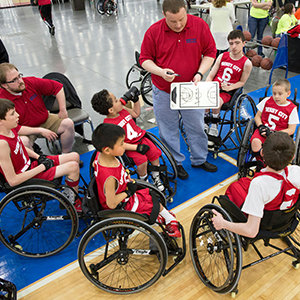- English
- DEUTSCH
- SPANISH
- FRENCH



I lead Perrett Laver’s Sports Practice – a phenomenal team made up of creative research colleagues and skilled project managers. The practice was founded with a focus on the unique social impact of sport, motivated by its ability to nurture potential, tackle inequality, and generate a sense of pride and cohesion.
We work with a range of organisations, from grassroots to high performance, to appoint leaders at executive and non-executive levels. We also deliver large scale leadership campaigns, such as our strategic partnership with Sport England and UK Sport, through which we have supported and stewarded over 100 candidates from underrepresented groups into leadership roles.
We have also worked on several advisory projects, particularly focused on enabling inclusive recruitment and sharing best practice in the space.


Our work with Sport England uses a unique blueprint to tackle issues of underrepresentation in leadership in the sports sector. We have created a dynamic network of over 250 candidates whom we offer sector specific training and development opportunities. The purpose of this network is to support candidate’s readiness to step onto board positions, and enable connectivity such that highly qualified individuals are introduced to relevant boards at opportune moments.
Over the last three years, we’ve made over fifty appointments to national governing bodies, partnerships, and charities. More recently, our focus on supporting county level organisations in sports such as football, cricket, yachting and hockey organisations has extended this to over 100 appointments. These appointees are doing fantastic things across the sector – and having very tangible impacts on their boards.
We also offer advisory support to organisations Sport England and UK Sport fund at times when they are about to run a recruitment campaign, ensuring they are abreast of best practice and well positioned to attract talent.

Sport has traditionally been a male dominated industry – how can recruiters diversify hiring practices, and what more needs to be done to increase inclusive leadership in sport?
It is true that the sports sector is still very male dominated – but we can see first-hand that change is happening at every level. In 2020, nearly two years after we started our work with Sport England and UK Sport, for example, we conducted a board audit which showed that female representation on boards had reached 43.5%. There is obviously still some way to go before we see gender parity, but there has been a visible increase nonetheless.
From a recruitment perspective, it is crucial to invest sufficient time and resources into every appointment. There will be things to consider around, for example, advert placement and language, but critically investing time also includes ensuring efforts to look beyond immediate networks. I would also always encourage organisations to fully interrogate their strategic needs when designing a brief, really questioning what skills are essential, desirable, and transferable. Organisations need to make sure that they are challenging themselves and assumptions about what the next leader will look like, throughout the process, from advertising to shortlisting and of course final interviews.
The sector also needs to think beyond recruitment to consider onboarding, retention and the continued development of individuals that have transitioned into leadership roles. We have seen a lot of important and impressive appointments over the last couple of years, but organisations must continue to hold themselves accountable and make sure that they create an inclusive culture that allows these talented individuals to thrive and contribute.
On July 28, the Commonwealth Games kicks off bringing together elite, youth and paralympic competition. How have you seen sport and sport leadership become more inclusive during your career?
Over the last year and a half there has been a huge focus on cultural and ethnic diversity, particularly in the wake of global protests around the murder of George Floyd and more recently Azeem Rafiq’s testimonies. Such incidents have caused a lot of introspection. However, we must be alert to knee jerk responses and ensure that change is authentic.
There are different challenges for different sports. For some, priorities may sit around growing participation and ensuring that the sport is open for all at a grassroots level. For others, it may be that the diversity of athletes and players is not being replicated in other areas of the game, such as coaching or leadership levels.
There are also significant issues around behaviour and cultures on the field, the locker rooms and amongst fans. Despite these challenges, I do feel positive about the future as we see tangible changes happening in education, processes, and representation.
It would be hard not to talk about changes around inclusion without mentioning the phenomenal growth of women’s sport too. It is such an exciting era for those rising stars, and likewise disability sports are attracting the attention they’ve deserved for some time.


In advance of the Commonwealth Games, Perrett Laver will attend the Beyond the Games conference discussing the role of sport in addressing the UK’s social and sectoral issues.
How do you think sport can make a positive influence in society today?
Sport captures people’s imagination and hearts. In its rawest form, it shows us what humans can accomplish, and what boundaries we can overcome, whether that’s in recreational or competitive sport.
A strong sporting infrastructure supports the nation’s health and wellbeing. It is a great tool for education, and indeed promoting development in other respects. It is also a great tool for social cohesion, bringing people together not just in their own teams or clubs, but across different leagues and competitions on the national and global stage.
Finally, where do you see the future of sport leadership headed in the next ten years?
In a space that has been heavily impacted by the pandemic, and continues to recover from it, sport needs people who can think commercially. It has proven to be a sector that, when needed, can be fleet of foot and innovative. However, it will continue to need people who can drive revenue as public funds continue to be squeezed. This may well be through increasing participation and engagement but can come from looking at media rights and new opportunities in OTT, for example, as well as examining other potential commercial partnerships and investment opportunities. Being digitally astute in this journey will be important, not just for operational efficiency but to capitalise on the opportunities a better understanding of data affords.
Over the next decade, I’m sure (indeed determined!) that we’ll also be seeing more diverse and innovative leaders.
We are already starting to see changes in where leadership comes from, both in terms of lived experience and creativity in the models and profiles shortlisted. It will be imperative that leaders, regardless of background, are inclusive through their own style and the culture they seek to instil, demonstrating themselves to be champions for diversity and celebrate difference.
Finally, leaders are becoming increasingly aware of the social value and responsibilities of sport. Organisations are already better at articulating and engaging with their purpose and recognising the need to drive corporate social responsibility (CSR). This global citizenship and relevance will serve to capture a wider audience and is realigning people with sport in new ways. Leaders will need to recognise how important CSR is as a direction of travel for any business, and be passionate about sport’s particular position and potential with regards to tackling and promoting consciousness around global challenges